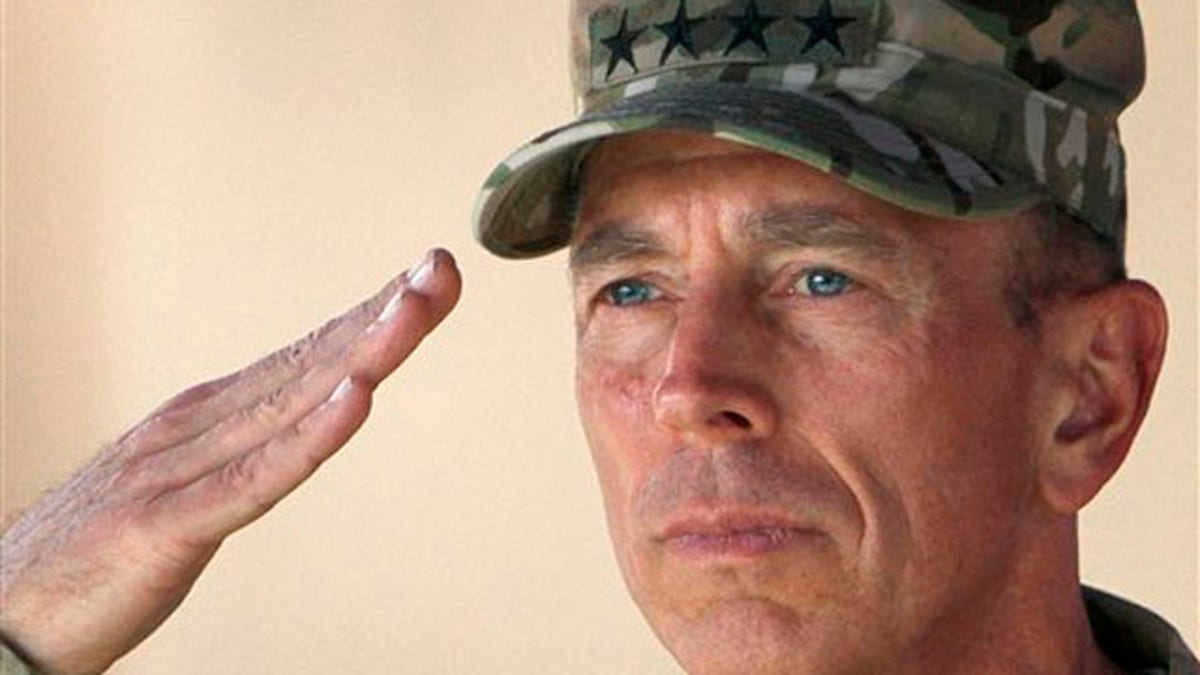
In this July 18 file photo, Gen. David Petraeus salutes during a changing of command ceremony in Kabul, Afghanistan. (AP)
WASHINGTON – WASHINGTON -- David Petraeus, a newly retired Army general who gained prominence charting U.S. strategy in the Afghan and Iraq wars, was sworn in Tuesday as director of the CIA, leaving behind his uniform and his military brain trust.
Retired last week after 37 years in the Army, Petraeus was sworn in as the 20th director of the so-called silent service in a private ceremony Tuesday.
Silent is what some in the White House want the well-connected former four-star general to remain, said two current and one former U.S. officials, speaking on condition of anonymity to discuss sensitive discussions at the National Security Council.
Admirers and detractors alike are watching to see whether Petraeus will use his influence with the media and Capitol Hill to pursue policies discordant to the White House officials who disagreed with him over the course of the Afghan war.
At a time when top figures close to President Barack Obama were arguing for a troop drawdown, Petraeus helped persuade Obama to increase troops in Afghanistan in a repeat of his counterinsurgency strategy in Iraq, a strategy now credited with producing tangible if fragile progress. That ran counter to the strategy favored by Vice President Joe Biden, among others, to leave the job to a much smaller force of trainers and special operations troops to hunt terrorists.
Biden presided over Petraeus' swearing in.
There is some unease among intelligence officials as Petraeus assumes leadership of an organization that has produced a series of grim assessments of conditions in Afghanistan, where the general oversaw the war directly or indirectly for more than four years. Petraeus has acknowledged differences with CIA analysts in the past, saying in Senate testimony that he thought the analysts were forced to rely on data at least six weeks old; He thought that skewed their analyses, whereas his battlefield data had been more current.
The most recent CIA assessment of the Afghan war could be used either to support or to reject Petraeus' counterinsurgency strategy, which advocated a surge of troops to protect the Afghans and buy time to build a local force to do the same. The CIA analysis predicted a grim, continued stalemate in fighting with the Taliban, according to one current and one former U.S. official, who spoke on condition of anonymity to discuss classified matters.
The recent announcement to draw down troops has invigorated the Taliban, both officials say. Intelligence intercepts between Taliban commanders show they plan to bide their time until more U.S. troops leave over the coming year, and then step up attacks, the current official said.
Policymakers could interpret that as damning Petraeus' counterinsurgency strategy of the past two years. Or they could argue that it shows the drawdown is coming too soon -- before the Taliban were weakened enough to be forced to cut deals with the Afghan government or before local forces were strong enough to present a credible deterrent.
The analysts have expressed worry that they may be forced to match their new boss' point of view, the current official said.
White House officials fear Petraeus might use the analysis in his new position to back his old war strategy. Petraeus addressed that concern openly when he told senators at the confirmation hearing that he would be serving the policymakers, not shaping policy.
Some top intelligence officials, current and former, still warn that tension with the White House could hobble Petraeus, as it did Obama outsider Dennis Blair, the retired admiral and former director of national intelligence. Blair clashed with then-CIA chief Leon Panetta and lost his post.





















